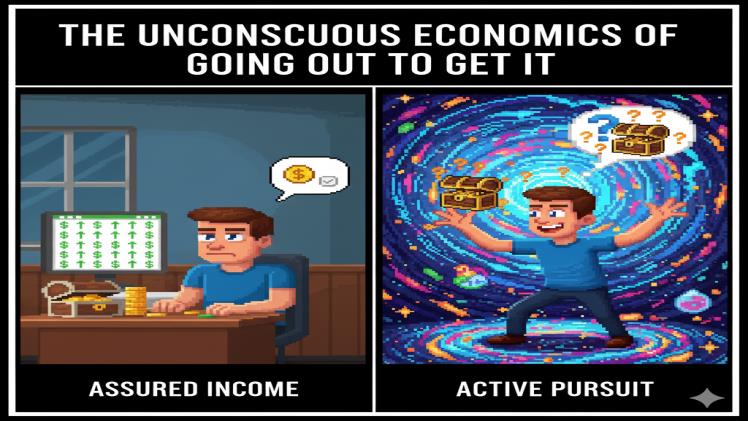 I always wonder: did you ever find that, on some decisions, you become magnetized — like magnetized, they draw you back, even when your brain tells you maybe it is not the time? It can be scrolling to get a like, checking your bank account after making a minor investment, or spinning a virtual reel, but human beings are programmed to pursue results, even when they are not aware of it. These games, such as Dragon Slots Spain, showcase this habit indirectly: the player is tempted by the next reward, the next near-win, the next dopamine rush, whether intentionally or not. But just what is actually going on inside our bodies when we are pursuing outcomes?
I always wonder: did you ever find that, on some decisions, you become magnetized — like magnetized, they draw you back, even when your brain tells you maybe it is not the time? It can be scrolling to get a like, checking your bank account after making a minor investment, or spinning a virtual reel, but human beings are programmed to pursue results, even when they are not aware of it. These games, such as Dragon Slots Spain, showcase this habit indirectly: the player is tempted by the next reward, the next near-win, the next dopamine rush, whether intentionally or not. But just what is actually going on inside our bodies when we are pursuing outcomes?
Contents
The Lure of the Next Win
The promise of reward is at the core of the pursuit of results. It does not necessarily have to be money, but it can be points, recognition or even a thrill of anticipation. According to behavioural economics, this is referred to as the subconscious pull of potential gain. These slightest nuances are exploited exceptionally well by digital interaction platforms such as Dragon Slots Spain.
Why Our Brains Love to Chase
Seeing the process of seeking results as uncontrollable is useful for taking a peek into the brain’s decision-making circuitry. The functions of the prefrontal cortex — logic and planning — are frequently sidelined by the limbic system, which controls feelings and short-term satisfaction. It is this imbalance that justifies our awareness of the low likelihood of winning, yet we press spin one more time.
It is also fatigued with decisions. The more decisions we make during the day, the lower our rationality in assessing risk becomes. Suddenly, the feeling of a poor choice that seemed to have been made before may turn into a ‘why not?’ moment. The perfect way to take advantage of this is through variable rewards, such as those found on online platforms and in digital loyalty programs: the uncertainty about who exactly we will receive as a reward can keep us occupied much longer than predictable results would.
The Emotional Economy of the Digital Space.
It is not only the mechanics of dopamine or the anomalies of cognitive bias that are important; our feelings contribute greatly to the subconscious economy of pursuing results. Fear, anticipation, arousal, and dissatisfaction form an unspoken account in our heads—a record of victories and almost-victories—that defines our behaviour in the future.
Use the Dragon Slots Spain case again. Every spin is not simply a possible payout; it is a miniature emotional experience. Even micro-wins will give the pleasure centres, and the near misses will cause more arousal, leading to another round. Such repetitive emotional experiences build over time, forming habitual patterns of behaviour, such as scrolling through an endless feed of notifications or points in a loyalty program. It is a push: the system does not impose, it seduces.
The Digital Reinforcement Loop.
The tendency to pursue results is enhanced in the digital environment. Gamified systems, online platforms and apps are based on a schedule of variable rewards and instant gratification schedules. This could be familiar with casino loyalty program or through apps: the system of small, random rewards promotes habitual use. Every communication is significant, even when the logical mind realizes that the impact is insignificant.
Here is where subconscious economics really comes into play. Social media platforms capitalize on our desire for new experiences and reward us by triggering the dopamine loop. It is not a bad design per se — it is an intelligent behavioural design. It is also the reason why online interaction eschews the line between conscious decision and unconscious drive.
Expert Insight
Behavioural economists often cite the cross-function of cognitive bias and digital design as the driving force behind chasing behaviour. According to a specialist in psychology of decision making, Elena Marquez, it is so because:
It is programmed in humans to prefer short-term, physical returns over long-term, abstract returns. When platforms stratify uncertainty, anticipation, and real-time feedback, the brain’s reward system is always on, making it much more difficult to exercise rational restraint.
This observation contextualizes our communication with systems such as Dragon Slots Spain, loyalty programs, or any digital system that exploits variable rewards. It is not about fear, but its consciousness. Knowledge of the subconscious processes involved in achieving results enables users to identify patterns and make more conscious decisions.